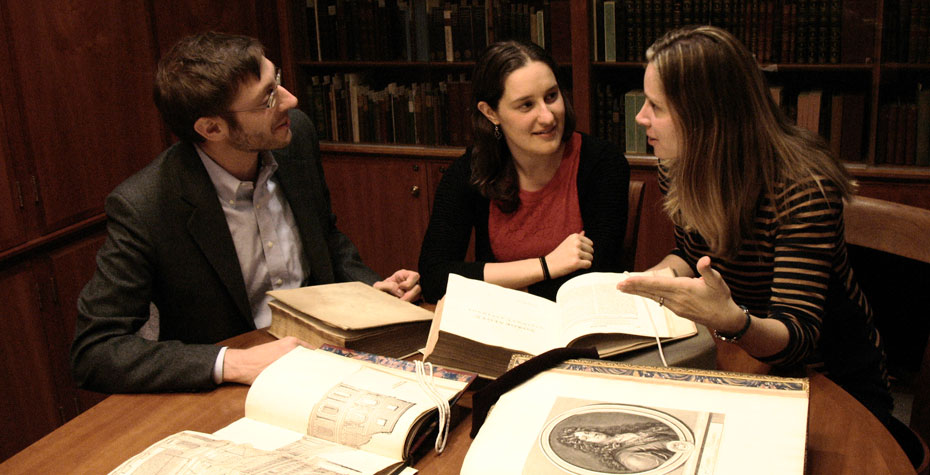New Three-Course Collaboration Promotes Cross-Disciplinary Conversations

Can theater make you a better person? A more patriotic citizen? A more caring and effective parent? A more devoted child? A more honorable politician? A more diligent student? A more creative entrepreneur?
This semester, students at Wellesley will be asking these questions from the perspectives afforded by three different courses in the humanities: Classical Civilization 210/310 ("Greek Drama"), taught by Adriana Brook, visiting lecturer in classical studies; French 333 ("French Classical Tragedy") taught by Hélène Bilis, assistant professor of French; and History 353 ("Sentimental Education in Early Modern Europe"), taught by Simon Grote, assistant professor of history.
Each course focuses on a different time period and culture, from early Athenian drama to tragic drama in seventeenth-century France and visual culture in Europe leading up to the Enlightenment. However, each course will ask students to consider common questions and themes relating to playwrights' and philosophers' assessments of the educational power of theatrical performance. Professors Brook, Bilis, and Grote will attempt to deepen their students' understanding of the questions common to all three courses by visiting each others' classes, placing common texts on their syllabi, and bringing their students together for a joint discussion. Brook will introduce an Athenian perspective to Bilis's students' discussion of Jean Racine's Phèdre, Bilis will present the French seventeenth-century afterlife of Sophocles' Oedipus Rex to Brook's students, and Grote will join both classes to discuss early modern critiques of the theater in connection with Jean-Jacques Rousseau's Letter to D'Alembert and Sophocles' Antigone. Toward the end of the semester, students in all three classes will attend a performance of Shakespeare's Hamlet and discuss it together over dinner.
These intertwined courses are the product of an initiative spearheaded by Dean Kathryn Lynch with the Office of the Provost. It is characteristic of the diverse disciplines of the humanities to ask students to consider similar questions about human beings, human societies, and the art, institutions, and environments they create. This semester, Dean Lynch worked with Brook, Bilis, and Grote to take cross-disciplinary conversations into a distinctive pedagogical collaboration, the Dean’s Humanities Collaborative Initiative.
The three faculty members planned the collaboration in January, adjusting their syllabi to incorporate new texts, visits to each others' classes, and the joint class meetings. They will seek to help students deepen their understanding of how the humanities can pose common questions, such as these about the theater, and encourage them to think about the varying methods and approaches the study of different humanistic disciplines will offer in providing answers. Engaging with a question from the perspective of history, classical studies, and French literary studies will enable students to become aware of the many perspectives one can have on a subject and to value the insights each approach can bring.
“I think what was most surprising for me was the realization of how symmetrical our collaboration was going to be,” said Brook. “As a Classicist I'm used to thinking about the necessity of understanding classical Greek tragedy in order to study the later writers and thinkers who were inspired and influenced by the genre. But, of course, the process works in both directions. A clear understanding of the ways in which ancient texts have been received, adapted and discussed in later contexts can offer Classicists valuable new insight on the literature they work with. I'm eager to see how my students' experience of Greek tragedy will be enriched by contact with these later sources.”
